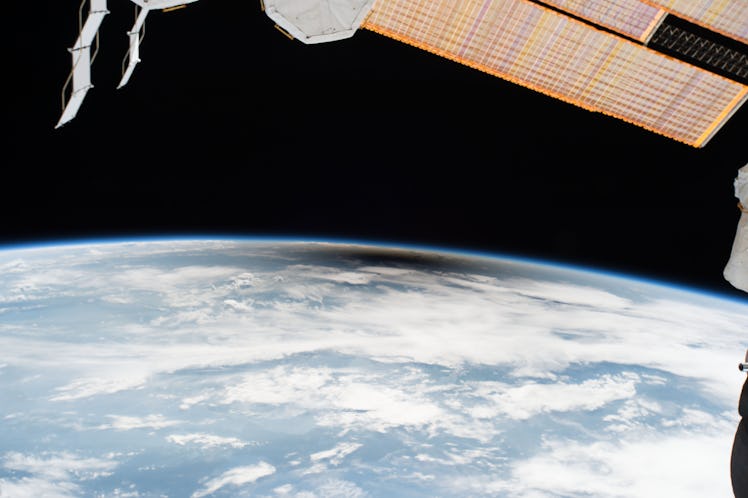
The Earth Might Literally Change Color Because Of Climate Change, So That's Scary
Just when we all were taking a deep breath after the State of the Union, it looks like bad news just keeps coming. At the moment, climate change is one of the biggest conversation topics among environmental activists and concerned citizens alike, but perhaps even those unfamiliar with the issue will start taking notice. Why? Well, according to a study from MIT, the Earth could change color because of climate change. Yes, really.
On Monday, Feb. 4, the MIT News Office released a new MIT study which found that climate change is causing "significant changes" to the ocean's phytoplankton, a component which is key in marine ecosystems, which will change the color of the oceans — and ultimately end up changing the color of the Earth all together. According to the study, the changes will cause colors to intensify and darken, with blue areas, like the subtropics, looking even bluer, while green areas will also become more intense. By 2100 more than 50 percent of the world's oceans will shift in color all together, per the study. The changes will come from phytoplankton, which will increase in some areas and decrease in others. That's a problem, since phytoplankton are key to these ecosystems because they're primary producers, meaning they feed marine life ranging from whales to microscopic creatures. They also contribute to the carbon cycle by being transferred to different levels of the ocean once they die, and then feed other creatures.
Despite these scary facts, there's a chance that we might not be able to notice the difference at first glance, since the change won't be outwardly obvious.
Feeling nervous? Just wait, because there's more. On Wednesday, Feb. 6, the National Aeronautics and Space Administration (NASA) and National Oceanic and Atmospheric Administration (NOAA) released a joint study that found that 2018 was the fourth warmest year since 1880. According to the study, the average global surface temperature has risen two degrees Fahrenheit since the 1880s, which is largely in part to increased greenhouse gasses and other monoxide emissions due to human activity. It comes following an October 2018 United Nations report which announced that humanity only has about 12 years left to try to limit climate change, and hopefully avoid the worst-case scenario of hitting a 2.7 degree Fahrenheit temperature increase. (Spoiler alert: it doesn't look hopeful.)
NASA’s Goddard Institute for Space Studies (GISS) Director Gavin Schmidt spoke about the latest findings in a press release shared by NASA. According to Schmidt, the fact that 2018 is one of the warmest years in Earth's history speaks to a growing trend concerning global warming. Plus, this trend will continue to impact other environmental factors, such as forest fires, sea levels, and extreme fluctuating weather.
“The impacts of long-term global warming are already being felt — in coastal flooding, heat waves, intense precipitation and ecosystem change,” Schmidt said.
So there's that. Two back to back studies about climate change in just one week. However, it doesn't look like any push to combat these dangerous changes will happen anytime soon. Throughout his presidency, Donald Trump has continued to question whether climate change is man-made. In fact, in October 2018, Trump told the Associated Press that he has a "natural instinct for science," which apparently helps him understand climate change and deny serious facts. The White House did not respond to Elite Daily's request for comment on Trump's statement at the time.
In addition to Trump's comments, he caused serious controversy in June 2017 when he decided to withdraw the United States from the Paris climate accord, which is a global deal to reduce greenhouse gas emissions and attempt to curb climate change.
Despite Trump's confidence, I have to admit that these new studies have me a little worried. Want to learn more about the impacts of climate change? Here's what to know, thanks to NASA.